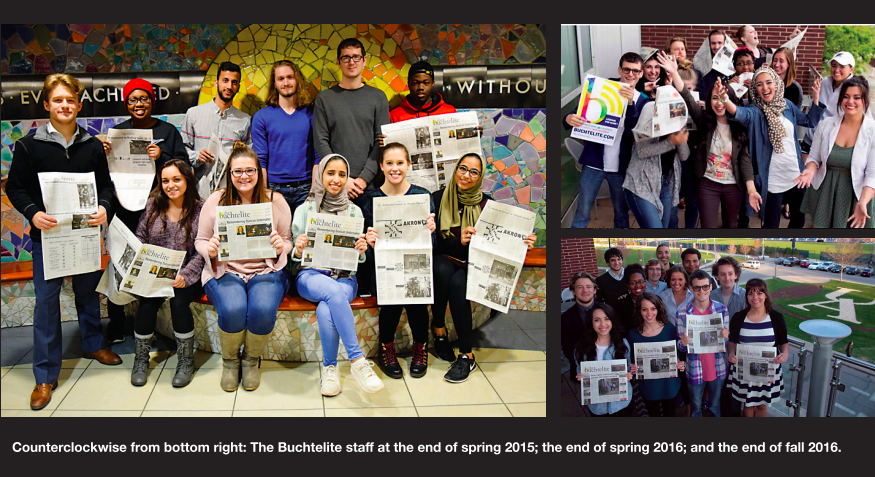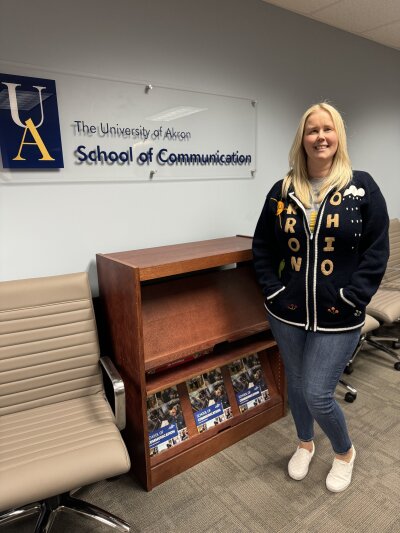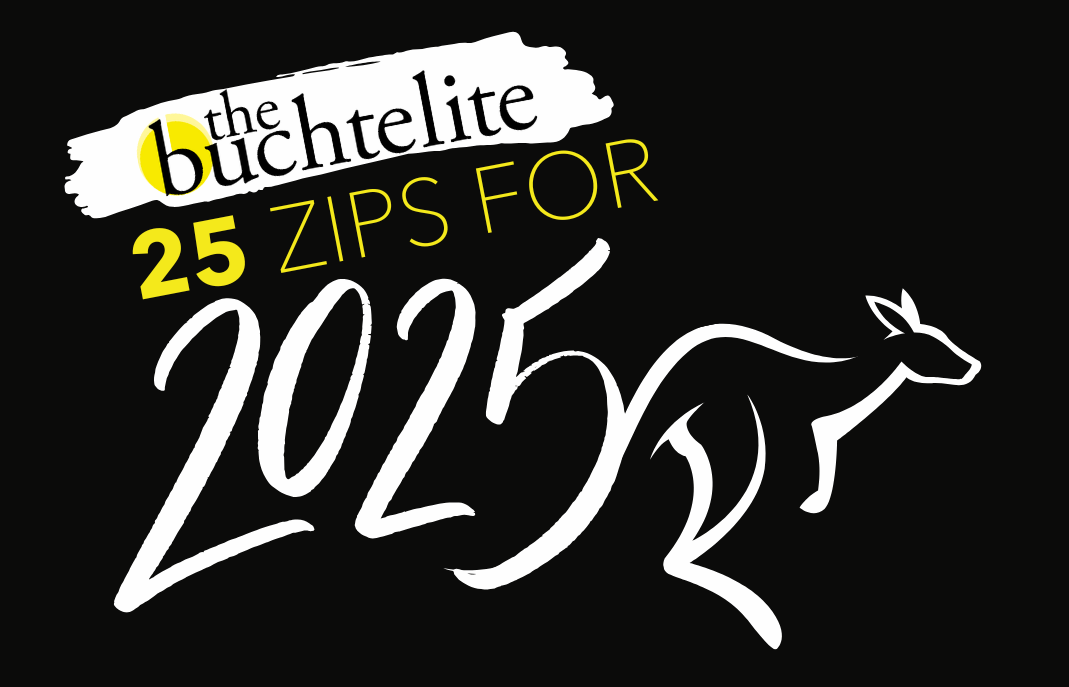Buchtelite to suspend publishing
Uncertain how long; communications director hopes for spring return
December 8, 2016
The Buchtelite, the 127-year-old independent student newspaper of The University of Akron, will suspend publication at the beginning of next semester, marking the second time in less than three years that the paper has gone on hiatus.
“The Buchtelite is important to the University, it’s important to the school,” said Theodore Avtgis, director of the School of Communications since July 1 of this year. “We will seek out alternatives to keep the paper alive for next semester.”
But with two of the paper’s nine editors graduating, and another four going out of the country to either work or study, it is unclear how long this suspension will last.
The paper’s current temporary adviser, Val Pipps, is leading the search for a new adviser next semester, who will be able to reconfigure the paper for what will likely be a full comeback in the fall of 2017.
“We’re looking for someone who will be able to hire a staff, work with that staff, and also sort things out on the organizational side of the paper so that, when it does come back, it won’t run into these same problems again,” Pipps said.
The Buchtelite is an independent student newspaper, which further complicates the matter of its continuance. Without any clear and established oversight, it falls into a “sort of no-man’s land,” as described by one of the paper’s former advisers, Roger Mezger.
Because general oversight (i.e., accounting) falls to UA’s Student Affairs, and the School of Communication hires and pays the adviser, neither entity is totally invested in the paper, Mezger added.
The Buchtelite’s status as independent also means that it does not receive any funding from the University itself, but relies only on revenue generated by its own business staff.
This business staff has not had any sort of professional guidance since 2013, when an Accounts Coordinator, who was a part-time University employee and managed the business side of the paper, left after a dispute with her superiors, according to a document from Mezger.
Two other factors have contributed to The Buchtelite’s funding issues: the University-wide cutbacks under former President Scott Scarborough in fall of 2015, which caused several key UA employees, who had an interest in keeping The Buchtelite running, to leave; and a changing media landscape in general, in which people turn more toward national, digital media and less toward local print media.
UA’s student newspaper, in short, does not make enough money to continue publication in the same form, nor generate enough incentive to have a steady, secure business and editorial staff.
“This year, it was difficult for us, a staff with over a year of experience, to even run the paper because, to say it simply, people don’t care very much,” managing editor Logan Lane wrote in an emailed statement. “The paper is treated as a campus novelty, something that needs to be kept alive because [people] feel like it should be. There’s no faculty or departmental effort to monitor or even keep the paper running.”
When The Buchtelite does return, it could be in a different format than the current one, which publishes two print issues per week and maintains a website.
One option, which many other college newspapers have taken up, is to go entirely online. Another option is to retain a print format, but reduce the numbers of issues per week and change the style of the printing.
Another possibility is for the paper to align with the University’s other student media, WZIP and Z-TV, which would act as a sort of organizational umbrella, one of whose functions would be publishing a newspaper.
More important possibilities regard the paper’s funding and editorial model, according to Pipps. Though it is now independent from the University, The Buchtelite could drop this status and merge into the College of Business Administration (for business and advertising) and the School of Communication (for an editorial staff and writers), becoming a laboratory enterprise for experiential learning.
Currently, only Buchtelite editors are paid; all writing and photography contributions come from volunteers. So unlike other area universities with a student newspaper, including Ohio State, Kent State and Youngstown State, communications students at UA are not required to contribute to The Buchtelite.
“I would say that that was the main problem this year,” said News Editor Kristina Aiad-Toss. “It’s very difficult to get students to volunteer their time and effort when they’re already involved in so many other things.”
If the paper were to become an experiential laboratory, some such problems might disappear.
“I’m saddened to hear [the news],” said UA Dean of Students Michael Strong, who worked for a student newspaper when he was in college. “As a member of our community I read The Buchtelite and I look forward to seeing it.”
Ashley Ritter, a senior public relations student who infrequently reads the paper, says she thinks it important nonetheless.
“I like that students can get experience [in writing for] publications, and I think a lot of students enjoy seeing what their peers are thinking about,” Ritter said.
Chris Horne, editor of Akron’s main cultural newspaper, “The Devil Strip,” expressed a similar sentiment.
“Student-run publications are always at risk because of attrition,” Horne wrote in an emailed statement, “[but] I’m usually going to side with there being more voices [in the community], not fewer…I think this is a loss to our community but I’m hopeful it isn’t a permanent loss.”
John Zipp, president of the Akron chapter of the American Association of University Professors, has often added an important perspective to various Buchtelite articles over the past two years.
“An engaged student press is an extremely important voice for students, and I hope that The Buchtelite comes back even stronger in fall 2017,” Zipp said. “With limited resources, I think that the paper has repeatedly produced well-done…articles.”
Those interested in joining The Buchtelite staff when it does return, or who in any other way have comments or questions regarding the newspaper, may direct their inquiries to Professor Val Pipps at pipps@uakron.edu.
Note: The editor would like to send his greatest thanks to all the writers and photographers who have consistently sacrificed their time to contribute to the paper this semester. Without their important work, such a paper would not exist – nor have a point in existing.














